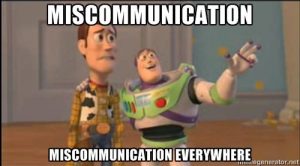Connecting with mentors is essential for Student Success. As somebody who was a mentor myself, I found it so much easier and less intimidating after I had already made initial contact with an instructor. I remember being very nervous my first time messaging Rachel Bergey about a student. I’m not entirely sure what I was super nervous about. I think it had something to do with not knowing this person and kind of messaging them out of the blue. It turned out that my apprehensions were unfounded. Rachel is a wonderful person and she helped me out immensely with many of my other students. Once that initial contact happened, I felt much more comfortable messaging her about other students and other issues in the class. I think the same can be said for many of the mentors that we have.
I think one of the things that mentors really need is an open line of communication. I have sent my mentor’s access to my office link. While I mostly mentioned that this is a great resource for students, I also mentioned that mentors are more than welcome to pop in to message me sometime. I think next semester, I will be sending out a message with my phone number in it as well as my office link.
As someone who was a mentor myself, I can say that one tip would be don’t be afraid of the mentors. Most of them are very caring and understanding teachers who only want what is best for their students. As someone who works for Michigan virtual, I think we can say most of us feel the same way as well. I think, personally, that many of the mentors just kind of feel in the dark. I myself had trouble because I didn’t understand how Blackboard worked. I wasn’t aware of 3-day grading policies, or of messaging policies back to students. It was hard for me to keep students successful when I wasn’t sure whether or not they were telling the truth (or just trying to get away with not doing the work).
Going back to my story about Rachel, the reason I had initially contacted her was that one of my students claimed that she had never messaged him back. While I had severely doubt of that, I went along with it for a day or two because I wasn’t sure about Michigan virtual policy for responding to students. This was not Rachel or Michigan Virtual’s fault. If I’m being honest, it was mostly mine. I was kind of thrown into the position, and many of the instructors had messaged me earlier in the semester to tell me things that I should know. I had neither the time nor the ambition to read these emails as I was teaching 7 different classes without a prep. It only became apparent after there was a problem that I probably should have read the emails.
I honestly don’t have a magical solution to this problem even having experience as a mentor. I believe it’s possible, that if I would have gotten a message directly from one of these mentors I may have felt more inclined to message them back if there was a problem on my end. I think a lot of it is just human nature of being scared of the unknown.


